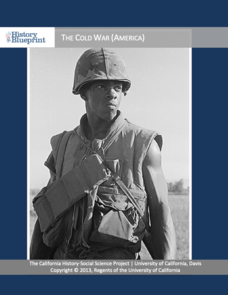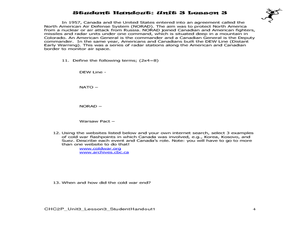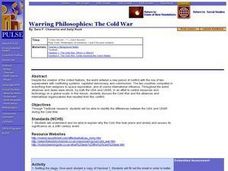University of California
The Cold War (America)
The Cold War—with its roots in World War II—impacts the world today. Using an extensive curriculum, scholars consider its impact through primary sources, including speeches and propaganda, as well as other skills-enhancing activities. An...
Constitutional Rights Foundation
The Cold War: How Did It Start? How Did It End?
What is the difference between a Cold War and a Hot War? Scholars research the beginning of the Cold War. They analyze diary entries as well as excerpts from various events during the 45-year standoff. To finish, they prepare final...
Curated OER
Western Civilizations, Chapter 27: The Cold War: Global Politics, Economic Recovery, and Cultural Change
Keep your scholars organized using this study plan and progress report tool, one of many great learning strategies featured in this online western civilizations resource! Although designed for use alongside the Western Civilizations...
University of California
The End of the Cold War (1979-1991)
Scholars use primary and secondary documents, as well as video evidence, to investigate the end of the Cold War. After completing the final installment of an eight-part series, class members better understand the issues surrounding the...
Student Handouts
End to the Cold War
Introduce your class to topics relating to the Cold War through a brief reading selection. Class members read the passage and answer four questions, which are provided on the bottom of the page.
Smithsonian Institution
Cold War
The Cold War was not necessarily always cold in temperature, but the relationship between the United States and the Soviet Union sure was frigid! Scholars read various passages, view exhibition graphics, and observe an artifact from the...
Curated OER
Review of our Presidents from the Progressive Era to Cold War
Covering the main events of the Cold War, this (mistitled) presentation includes photographs, political cartoons, and amusing graphics to illustrate its points. The information on the slides is helpful for an overview of the Cold War,...
Curated OER
Chapter 28: Red Flags and Velvet Revolutions: The End of the Cold War, 1960-1990
Set your historians up for testing success using this interactive flashcard tool. It is one of many learning strategies offered in this thorough online resource. Although designed for use with a text, the site is valuable independently....
Roy Rosenzweig Center for History and New Media
End of the Cold War
How significant was the Cold War during the 20th century? After reading and analyzing speeches by Ronald Reagan and Mikhail Gorbachev, learners consider the historical context of foreign policy decisions made during the Cold War by both...
Curated OER
The Cold War: 1945-1991
The best part of this presentation about the Cold War is the various pictures, photos, and maps throughout the slides. The timeline of this time period is difficult to follow in the presentation, as well as the details about several main...
Curated OER
The Origins of the Cold War, 1945-1949
Students investigate the early years of the Cold War and the origins of containment. Both supporters as well as critics are probed to examine the differences that emerged in the months following the end of the war in Europe. This unit...
Curated OER
The Cold War And Beyond
High schoolers interview an adult that grew up in the United States during the Cold War to develop an understanding of the concept of mutually assured destruction. They focus the interview on how the person dealt with the threat of...
Curated OER
The United States and the Soviet Union were Engaged in a Cold War
Students work together at figuring out the definition for what cold war means. In this social science lesson, students listen to "The Butter Battle Book" by Dr. Seuss and recognize how this story relates to the cold war between the...
Curated OER
The Cold War (1945–1963)
In this online interactive history quiz learning exercise, students respond to 46 multiple choice questions about the Cold War. Students may submit their answers to be scored.
Smithsonian Institution
The Price of Freedom: Americans at War
An interactive resource covers all of the United States' most prominent and influential historic wars including the Vietnam War, the Cold War, the War of 1812, and the Korean War. Learners observe cause and effect as well as how violence...
University of California
The Vietnam War (1945 – 1975)
Have you ever wanted to do something so perfectly you wound up not doing it well at all? Young historians use primary and secondary documents to analyze the United States involvement in the Vietnam War. The issues surrounding the...
Curated OER
What Was the Cold War About?
Young scholars explore a website to gather some first impressions of the Cold War era and its impact on Canadian society and politics. They, in groups, answer questions about the Cold War on a worksheet imbedded in this plan.
Smithsonian Institution
POWs
Why did Vietnam POWs and their families receive more media attention than POWs in previous wars? To answer this question, class members view artifacts, read articles, and engage in class discussion. Individuals then assume the voice of...
Curated OER
Introduction to the Early Origins of the Cold War
In this Cold War worksheet, students read a 4-paragraph selection about post World War II diplomacy and then list key dates and events noted in the selection.
Curated OER
Vietnam 1945 - 1975 :The 10,000 Day War
Each phase of the Vietnam War is fully developed and defined in terms of political cause and effect and social action. Phase one covers the onset of the war in 1945 through the French defeat at Dienbienphu. Phase two discusses American...
University of California
Decolonization
The ripple effect from one small event can impact many others. Young historians research the ripple effect World War II had on decolonization in the second installment of an eight-part series. Through primary and secondary documents as...
Curated OER
The Cold War
In this Cold War worksheet, students read 3 brief selections about the conflict and then respond to 13 short answer and multiple choice questions based on the selections.
Curated OER
Warring Philosophies: The Cold War
Students explain why the Cold War took place and ended. They analyze its significance as a 29th century event. Students identify the differences between the USA and USSR during the Cold War.
Curated OER
The End of WWII and The Beginning of the Cold War
In this end of World War II and Cold War study guide worksheet, high schoolers fill in 44 blanks in a passage with the appropriate words to complete the sentences regarding the time period.

























